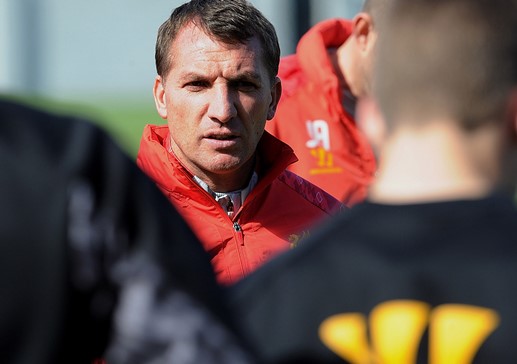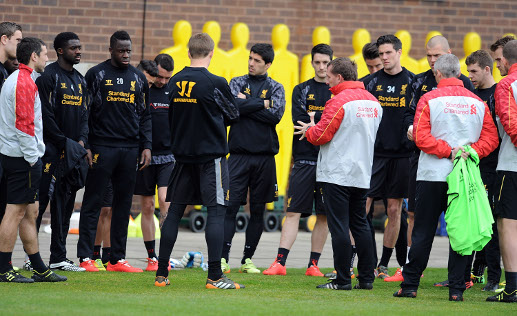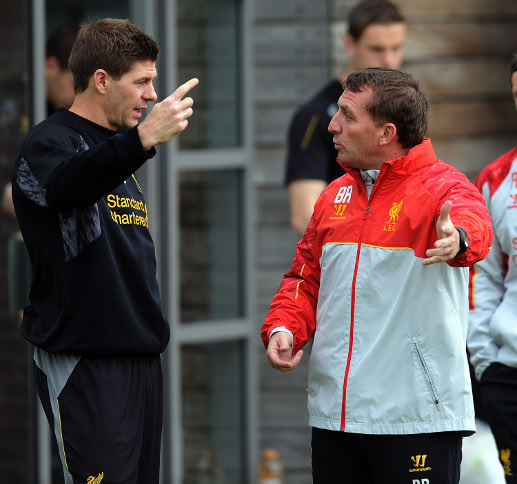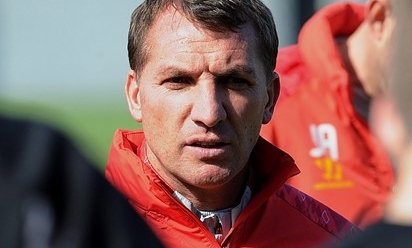Revealed: What's in a day for Rodgers?
Liverpool's intensity has received acclaim this season, but it's not just the players pressing to ensure dominance. Brendan Rodgers is also always on the move.

Positioned adjacent to the cosy, almost-enveloping black leather couches in Brendan Rodgers' office, stands a flipboard. The first page of the easel contains the inspirational words of Hillsborough campaigner Margaret Aspinall - "stress is difficult but stress is also good; it gives you a determination to fight" - in its original format, and in the languages pertinent for the squad; Spanish, French, Portuguese. The manager flicks past a few tactical spreads, and stops at the message he wants to share.
C - Commitment
O - Organisation
R - Responsibility
E - Excellence
It is the intelligence he continually communicates with his players. "I want commitment, not motivation, because motivation is fleeting, it goes by feelings," Rodgers explains in an exclusive with Liverpoolfc.com.
"You may get up in the morning and feel you don't want to do it, so what? You don't do it? If you're a life-saving surgeon and you've got five operations a day, and you work on motivation, you may be motivated for the first four, but the fifth one needs their life saved just as much, so you have to be committed to the cause."
"Once there's commitment, I will then organise a plan for them to be the very best they can be. Not for me - for them, in order to improve," adds Rodgers, as he explains this principle.
"I then say, it is your responsibility. I will give you all the tools, an elite environment, a high-performance focus, we give you the best people: medical, mental, technical, tactical and I will manage that.
"All those factors will allow you to perform to a level of excellence. I tell all the players: 'the crown is on your head, you're the king of your destiny.'"
The 41-year-old doesn't just expect those in the squad to exceed expectations, he demands an incredibly high output from himself.

What's in a day for the Liverpool boss?
Rodgers is usually the first to arrive at Melwood, with the exception of the cleaners, who sometimes beat him to the complex. He enters the gates between 7am and 7.30am.
The manager will have his breakfast, research, study and prepare himself for the day. At 9am is the daily staff meeting, with key members of the technical team. This is where he sets the agenda.
Between 10am and 10.25am, Rodgers finalises his plans ahead of training.
The session starts at 10.30am and the Northern Irishman will replicate real-match situations to test and sharpen the players.

Training usually ends at noon, and Rodgers then oversees the players doing gym work or whatever activity is specific to the day.
He proceeds to have lunch at the Melwood cafeteria before embarking on the next stanza of his day.
From 1.30pm, Rodgers is involved in several meetings daily. It usually encompasses opposition analysis, a full review of the previous game, sessions with Alex Inglethorpe (U21s manager), and various other catch-ups with core individuals and departments.
This will last for the entire afternoon through to the evening. He normally departs Melwood at 7pm, but is known to stay longer.
When he leaves the facilities in West Derby, his work does not stop. Rodgers makes it his duty to follow all football happenings.
"The job for me is continual," he says. "I live and breathe for football. I study it, I look to be better, for how we can continue moving forward.
"And I'm ambitious. I want the club to achieve, I want the players to achieve. I will be at the planning until I go to bed."
With all that hard work, it's no wonder Rodgers is still "sleeping very, very well."
Follow the author: @1stLadyOfFooty.



